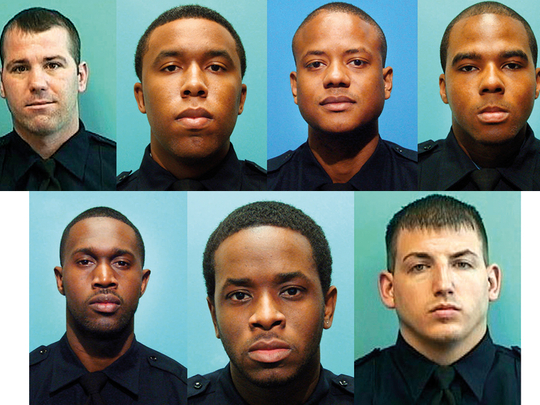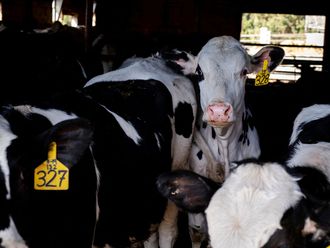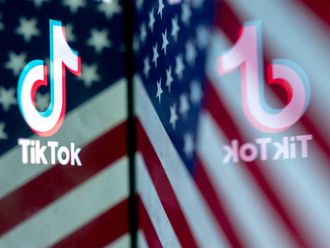
WASHINGTON: Two US police officers, described by the prosecution as “both cops and robbers”, were convicted Monday in one of the country’s most explosive recent cases of law enforcement corruption.
A jury convicted Baltimore detectives Daniel Hersl and Marcus Taylor of racketeering and racketeering conspiracy.
They will be sentenced later and could face life in prison if convicted.
The trial revealed widespread illegal practices among officers immersed in a slum environment overrun by criminal gangs.
At the heart of the case was the Gun Trace Task Force, a supposedly elite plainclothes unit responsible for tracking down and seizing illegal weapons in the crime-ridden port city with a population of around 600,000, nearly 60 per cent of whom are African American.
All of their victims were black men, many of them drug dealers who the corrupt police officers knew could not go to the authorities to complain.
Six officers pleaded guilty to various charges and four of them delivered gripping testimony at the trial of Hersl and Marcus.
Several avowed drug dealers received immunity to allow them to testify about their encounters with the tainted unit.
Testimony shed a harsh light on racketeering, burglary, false statements and armed robbery by the officers.
Their job was to take illegal guns off the street in a city rife with murders. Instead, the Task Force added to the problem by reselling weapons they stole.
The corrupt detectives also trafficked in drugs, planted false evidence on suspects and lied about their overtime hours.
Suspended without pay
On Monday evening, acting US Attorney Stephen Schenning said he was hopeful that the police corruption case “will begin a long difficult process of examining how” the Baltimore force polices its own.
“We hope that police officers live up to the honour and privilege of the badge,” Schenning said on the courthouse steps.
Acting Police Commissioner Darryl DeSousa said in a statement immediately after the verdict that the department will move to fire Hersl and Taylor, who have been suspended without pay since being indicted and arrested in March.
“We recognise that this indictment and subsequent trial uncovered some of the most egregious and despicable acts ever perpetrated in law enforcement,” DeSousa said.
William Purpura, Hersl’s lead attorney, said the family was disappointed in the verdict but noted that the jury “did acquit him of one of the more serious crimes.” He said a decision about a possible appeal would be made later.
Both men were cleared of possessing a firearm in pursuance of a violent crime.
Taylor’s defence team and his relatives did not immediately speak to reporters after the Monday evening verdict.
Much of the testimony during the trial focused on Gun Trace Task Force members who pleaded guilty, including the out-of-control unit’s one-time supervisor, Sgt. Wayne Jenkins. He was portrayed as a wildly corrupt officer leading his unit on a tireless quest to shake down civilians and find “monsters” — big time drug dealers with lots of loot to steal.
His subordinates testified that the one-time amateur mixed martial arts fighter told his officers to carry BB guns in case they ever needed to plant weapons and occasionally posed as a federal agent when shaking down targets.
Former colleagues said Jenkins’ sledgehammer approach to policing extended to having actual sledgehammers — along with crowbars, grappling hooks, black masks and even a machete — stored in his police-issued car to ramp up illegal activities.
It’s not clear when Jenkins and the other ex-detectives who pleaded guilty will be sentenced by a federal judge. Four disgraced ex-officers testified for the government in hopes of shaving years off their sentences.
‘Business model’
The defence teams for Hersl and Taylor had asked jurors to distrust the motivations of the government’s witnesses, including a number of convicted drug dealers who received immunity for their testimony in the case.
Schenning said he was thankful the jurors saw through that.
“That was the business model for this organisation: They thought if you rob drug dealers they have no place to go,” he said.
Purpura did not deny that his 48-year-old client took money but said the thefts didn’t rise to the more serious charges of robbery or extortion. The two defence teams also attacked the veracity of the four disgraced detectives, noting that they’ve admitted to lying for years to juries, judges, colleagues and their families.
Assistant US Attorney Leo Wise reminded jurors that the central question in the trial was the actions of the rogue police unit, and whether some of their robbery victims made money “selling drugs or Girl Scout cookies” was irrelevant.
Public defenders say there could be a few thousand tainted cases stretching back to 2008 involving the jailed members of the disbanded Gun Trace Task Force. So far, roughly 125 cases involving the eight indicted Baltimore law enforcers have been dropped.
“Beyond the sheer credibility issues that should have been raised at the time, given how embedded their crimes were in their police work, all cases involving these officers are tainted,” said Debbie Katz Levi, head of special litigation for Baltimore’s Office of the Public Defender.












